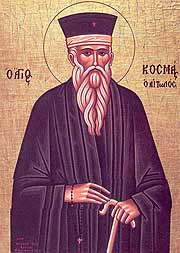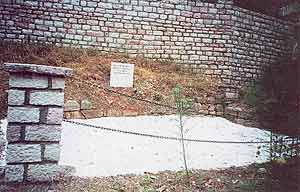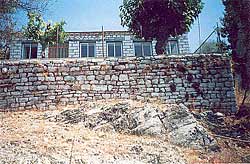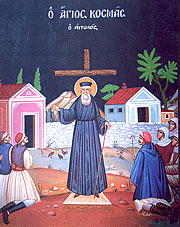
Little is known about Constas’[2] parents. They were both weavers. His father, Dimitri, came from the village of Grameno, and his mother was born in the village of Vlachochori. Because of repression by the Turkish authorities, they were compelled to flee Epirus and settle in Aetolia in 1700. There they gave birth to two children— Сonstas and his older brother Chrysanthos.[3]
 The foundation of St. Cosmas' parents' home.
The foundation of St. Cosmas' parents' home.
After the conquest of the Byzantine Empire, the educational system reached a state of deep crisis. It was provoked by a set of causes that were the consequence of the fall of a nation: scholars and educated people fled to the West, a demographic crisis ensued, social networks were broken up, and the cities declined.
The foundation of a small number of schools in the more developed regions of Greece could not change anything substantially for the better. The problem lay in the complete absence of any organized educational process; during the years of Turkish rule, in many areas, the population no longer felt the need to receive an education, and nothing was done to correct that situation.
This is the period that saw a wave of mass islamization of thousands of Christians, mainly in the distant and inaccessible regions. The acceptance of Islam often bore a massive and voluntarily character. Some strove to attain high positions and tax advantages; others, after a series of bloody suppressions of national resistance uprisings, lost hope in ever being freed from the foreign yoke. More and more people were abandoning the faith of their fathers. Forgetting their country’s former grandeur, they no longer placed their hope in a great future.
Cosmas was a true Christian—he could not be concerned with his own salvation alone; his pain for his countrymen and love of neighbor caused him to dedicate himself to the service of enlightenment, which would later become the very meaning of life for him. “Thus, the words of our Lord Jesus Christ that a Christian, be he a man or a woman, should not only care for his own salvation, but should equally take care that his brothers not fall into sin. From the time that I heard this … it ate away at my heart, like a worm eats away at a tree, and I thought about it, not knowing what to do about it.”
Cosmas remained in his village until he was twenty, helping his parents in their work. Life amongst his simple, impoverished, at times illiterate countrymen not only determined his decision to devote himself to the work of his nation’s renaissance, but also aided him along that path. He was aware of the villagers’ problems first hand, and could communicate with his countrymen as an equal and not as an office academic acquainted only theoretically with the situation—any of whose attempts to missionize the people were doomed to failure.
From his youth Cosmas had a thirst for knowledge, and he always tried to make use of any opportunity to receive an education. “I, Christians, dedicated forty to fifty years to learning … I learned a depth of wisdom.” His biography testifies, “While still a layman, the blessed one long had a strong desire in his heart to use everything he learned for the benefit of his Christian brethren.”
In Cosmas’ homeland of Aetolia there were many monasteries: St. Parasceva in Mandra, St. John the Baptist in Dervikste, the Dormition of the Mother of God in Katafigi… Monasteries at that time were not only spiritual, but also educational and social centers. Probably the saint received what was called “sacred” learning in one of these monasteries, which consisted in reading, writing, basic arithmetic, prayer, and Church services.
For eight years, Cosmas studied under the guidance of Hierodeacon Gerasim (Litsikas) in Sigditse. After ten years of study, he returned in 1732 to his homeland. At age twenty he had begun to study grammar[6] in the community school of Lombotina.[7] Cosmas was a capable and gifted student, and in the same year of 1734 he was appointed as teacher to the Lombotina community. Such a practice was widespread at that time: capable students often combined their study with teaching. During winter St. Cosma taught in the church, and in summer under the shade of a tree. He knew the textbooks by heart and taught without looking at the books. His method of teaching was somewhat advanced, and differed in many respects from the generally accepted educational methodology. He preferred a living dialogue with his students over a didactic monologue. Striving for complete trust and mutual understanding, Cosmas did not use physical punishment.[8] On Sundays he talked with his compatriots, expounding on the Gospels and service texts to them. The saint tried to use not books, but a language that would be understood by simple people. Folk tradition has it that the first school opened by St. Cosmas was already functioning then. It was located in Aetolia, in the village of Taxiarchis.
Constas continued his education in Elinomousiou Vrainon. This educational institution was opened at the monastery of St. Parasceva by the well-known preacher, Eugenios Yannoulis. There Cosmas studied the vast monastery library, which preserved thousands of rare manuscripts. He associated with scholars who had refused emigrate to the West, and who had hidden themselves in the monasteries. Besides his humanitarian disciplines, Cosmas was able to broaden his knowledge in arithmetic and geometry. How long he studied we don’t know, but probably he remained there until his departure for Mt. Athos, combining his studies with teaching.
Mt. Athos in the eighteenth century was the cultural and social center of Greece, and the school at Vatopedi Monastery was in its glory—the famous Athoniada. That is where Constas went to continue his education in 1749. The Athoniada was in its height, and was a leading educational institution, which specialized in the teaching of logic, grammar, and theology. The foremost scholars of Mt. Athos were Cosmas’ instructors. One of them was notably the teacher of philosophy, “the most learned Eugenios”—Eugenios Voulgaris.[9] Possessing a magnificent education, he was famous not only in Greece, but also beyond her borders (for example, he conducted a lengthy correspondence with Voltaire). At first interested in the ideas of Western enlightenment, he later rejected them as contradictory to the Orthodox tradition, which he had always defended. He also upheld the Great Idea—the rebirth of the Byzantine Empire and the unification within it of all Orthodox peoples. Pain for the fate of Orthodoxy and fatherland induced the disciples of Voulgaris to band together in a secret society. Its main goal was the struggle with illiteracy. “In that period, a group of Eugenios’ students, including Cosmas, seeing the threat to Orthodoxy and their nation, unanimously agreed in the name of the Holy Trinity to help the nation in the spread of literacy.”
On Mt. Athos, Cosmas not only received the necessary knowledge, but was also strengthened in his resolve to dedicate himself to the work of enlightening the people. Cosmas was there not just due to circumstances—he considered foreign study inacceptable,[10] and Athos was the only place in Greece where he could receive a fundamental education. There he not only became firmer in his faithfulness to the Orthodox tradition, but also found people of like mind with him, who strengthened his faith and resolve to facilitate a national renaissance. Cosmas gradually prepared himself to carry out his intentions: he studied patristic literature and the Holy Scriptures. He was also aided by lessons in rhetoric which he later received in Constantinople.
Cosmas’ biographer tells of the subsequent events in his life: “Still bearing the secular name Constant, the righteous one had even in his secular clothes adorned himself in the beauty of the monastic image, not sparing strength or labors, and accustoming himself to perfect asceticism. But then the teachers departed from this glorious and famous school, and it unfortunately became empty, and declined. Good Constant, departing from thence, came to the holy monastery of Philotheos. There he received the monastic tonsure and with great zeal progressed in the monastic life. Soon when the monastery needed a priest he was at the fathers’ strong persuasion and fervent request ordained a hieromonk.”
In 1760, Cosmas left Mt. Athos, having lived there for ten years. His main reason for leaving the monastery was his concern for his countrymen and his yearning for apostolic service. “He often said, ‘What a great need my brother Christians have for the word of God! Therefore, learned people should direct themselves not to royal houses, not to noble courts, and not to disseminate their learnedness for wealth and fame, but in order to obtain a heavenly reward and unfading glory, they should most of all teach the simple people, who live in great ignorance and coarseness.’ But for all his desire, for all his fiery zeal for the good of his brothers, he was also able to imagine the difficulty of apostolic preaching, and as a man with humility of wisdom and meekness, he did not rush to begin this work under the guidance of his own desire without being sure of God’s will for it. Therefore, wishing to know whether his intention was pleasing to God, he opened Divine Scripture, and miraculously saw the Apostolic words: Let no man seek his own, but every man another’s wealth (1 Cor. 10:24); that is, let everyone seek not that which is beneficial for himself, but what should bring benefit to his brother.”
Cosmas’ decision came by no means from any disappointment in monastic life. “You can say, ‘You are a monk—what are you doing in the world?’ And I, brothers, am acting wrongly. But because our people have become illiterate, I said, ‘Let Christ lose only me … but receive all the rest. Perhaps by God’s mercy and your prayers, I will be saved.”
Cosmas arrived in Constantinople with the firm intention to begin his activity as a preacher. There he revealed his thought to the blessed hierarchs and teachers, and hearing that they all with one voice encouraged him to begin this godly work, he took the blessing of Patriarch Seraphim.[11] Seraphim was from Delvino, and thus was well aware of the tragic situation in mainland Greece. Furthermore, before ascending the Patriarchal throne he was the metropolitan of one of the most problematic regions of Greece—Thrace and Aetolia. We can suppose that Cosma’s first missionary route was charted with the Patriarch’s participation, who regarded with great enthusiasm the mission Cosmas had taken upon himself.
Cosmas’ travels and activities would be traditionally called missionary. But is that term entirely appropriate? After all, at the time of his preaching, many inhabitants of the Balkans were already Christians. Without a doubt, the preaching of Orthodoxy was entirely justified and relevant—part of the population had voluntarily accepted Islam, and Catholic and Protestant propaganda was on the rise.[12] The influence and authority of Western Enlightenment was also growing. Many Greeks, Serbs, and Bulgarians remained Orthodox only in name, but not in spirit. They were little acquainted with the basics of Orthodox teaching, and had departed from the patristic tradition. Cosmas’ missionary activity was multifaceted—on one hand, he strove to return those who had left Orthodoxy to the Church’s bosom, and on the other hand, he wanted to renew the purity of Christian life, spread the patristic tradition, and strengthen the people’s unity.
“Thus blessed Cosmas began to preach the Gospel of the Kingdom of Heaven first in churches and villages in the outskirts of Constantinople, and then he set off for Nafpaktos, to Vrachochori, Mesolongi, and other places, then returned again to Constantinople. Asking the advice of the current Patriarch, Sophronios, and receiving his permission and blessing once again, he began even more ardently, zealously, and selflessly to preach the words of the Gospels. He passed throughout Dodecanese islands, and having taught the Christians to bring forth repentance and do works pleasing to God and worthy of repentance, he returned again to the Holy Mountain in 1775. Visiting the monasteries and sketes there, Cosmas gave instructions to the fathers and devoted some time to reading patristic books. But because his heart was filled with love for Christians and the desire to help his brothers (he spoke about this many times to many fathers), he could no longer hesitate. Departing from the Holy Mountain, Cosmas began his preaching from the surrounding villages, and continued to preach in Thessalonki, Berea, and throughout Macedonia. He passed through the regions of Kimarou, Acarnania, Aetolia, all the way to Arta and Preveza, and from there he sailed to the islands of St. Maura and Cephalonia.”
St. Cosmas visited not only Greece with his preaching, but also Bulgaria, Serbia, and Asia Minor. “Thousands of towns and villages have not heard the word of God,” said Cosmas in one of his lessons. Understanding the complexity of the situation, he travelled through practically the entire territory of the Constantinople Patriarchate. He gave particular attention to the regions that had the threat of islamization and the loss of their national cultural identity hanging over them. Thus, he was in Northern Epirus several times, visiting the same settlements repeatedly and supporting the local inhabitants with his fiery sermons.[13]
 In Taxiarchis, the stone where St. Cosmas would preach remains.
In Taxiarchis, the stone where St. Cosmas would preach remains.
Hundreds of preachers and scholars had made attempts to enlighten their compatriots. Why didn’t their missions produce any significant results? Some gave up at the first hardships encountered; others were not prepared for such a responsible and selfless service. Not having a well thought out plan and program of action or the necessary knowledge and talent, they quickly despaired, not managing to overcome the initial difficulties that arose.
Nevertheless, St. Cosmas did not give up, and selflessly carried on with his work of enlightenment, which was bound up with a multitude of dangers, depravations, and heavy trials. The saint spoke with the people not as a teacher with his students, but as an equal, in a simple and accessible language, and not in archaic bookish language. The people did not understand that kind of language, and it therefore repelled and estranged them; these feelings were inevitably transferred to the preacher.
The people began to greet the saint enthusiastically; thousands of people followed him, along with nearly forty priests. Eventually praise of him spread throughout Greece, and tens of thousands of people came to hear him preach.
“No matter where the blessed one went, there was always a great gathering of Christians, who attended the grace and sweetness of his words with contrition and reverence, and this was accompanied by corrections of their morals and great spiritual benefit. His teaching (as I myself heard him), like the teaching of the fishermen,[15] was quite simple, calm, and meek, which proved beyond a doubt that he was filled with the grace of the meek Comforter and Holy Spirit.”
“Word of Cosmas of Aetolia spread throughout Greece, evoked delight and a strong desire in all regions … to receive him and listen to his “Instructions.” Thus, all came out with their wives and children, the young and the old… The preacher, seeing the great gathering of people from different villages … preached for two or three days.”[16] According to testimony of eye-witnesses, the people followed his preaching without interruption. “After the Liturgy this monk invited all the inhabitants of the village to Raedo square in the western part and taught them there for many hours. His teaching went on so long that little Stamato began to feel hungry, and often tugged at her mother’s dress with the words, ‘I’m hungry, mama.’ But the villagers continued without interruption to follow the monk’s God-inspired words and counsels. Certain portions of his teaching remained forever in Stamato’s memory, and she repeated them to us word for word.”[17]
Due to the multitude of people which no church could possibly contain, Cosmas often had to preach outside the village, in the fields. Therefore he had the custom of announcing beforehand where he wanted to stop and deliver his preaching.[18] In that place they would prepare and erect a large wooden cross, then place a bench at its base on which Cosmas would stand and preach. At the end of the preaching, Cosmas would take the bench, but leave the cross in its place as a continual reminder of his sermon. Later the Lord manifested a multitude of miracles in those places where the crosses stood.
 Depiction of St. Cosmas preaching in front of the cross.
Depiction of St. Cosmas preaching in front of the cross.
People were drawn to Cosmas’ unmercinariness, and his conviction. The saint visited the most inaccessible localities, where not only was there no transportation, but no roads either, and robbers and outlaws had their hideouts. The people appreciated his self sacrifice, for he denied all his own personal interests for the sake of his work of enlightenment, and set out upon the long, exhausting, and dangerous trail along the Balkan Peninsula. “And now, by the mercy of our Lord Jesus Christ, I have no wallet, no trunk, no home, nor any ryassa other than the one I am wearing.” Thus he became an example of the selfless love for neighbor that he spoke about in his teachings, and called his countrymen to follow his example. “My work, your work, is the work for our faith and nation.”
